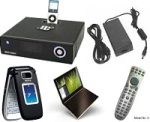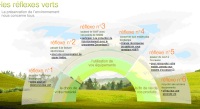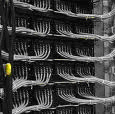Filed under: Best Practices in France | Tags: Convergence, Data Center, Low Energy Mode, Orange, Shadowing Day, Telecom, User Behaviour
Marc Fossier, Chief Corporate Social Responsibility Officer for the France Télécom – Orange Group.
Orange is France’s leading telecom operator and Europe’s 3rd mobile operator. The provider offers triple media services (broadband ADSL, TV, phone) and is one of the worldwide providers of broadband services to multinationals. The company is present in 32 countries and has a turnover of 53,5 billion euros per year (1).
Marc Fossier. Engineer by education, Fossier has a vast and broad experience within the France Telecom Group. He has held various positions, among covering the positions of Head of Industrial Procurement and International Affairs, Head of the Payphone Division and CT). In March 2009, Fossier was appointed in the newly created executive position of Chief CSR.
Orange is Sustainable Telecom Leader in Europe, concluded by the UK based consultancy Verdantix after interviewing senior telecom and purchase representatives in 2008 (2). Two of the main conclusions were :
1. Customers expect Sustainable Behaviour of the Supplier. Suppliers should meet social and environmental procurement criteria. This includes CSR reporting, green house gas reduction plans and fuel efficient car fleets. Despite all efforts of telecom companies to create proper reports and calculate their own emissions, these are no longer considered as differentiating from their competitors. These efforts have simply become a ‘licence to operate’.
2. Customers are asking for Sustainable Solutions. In other words : Customers expect a broad range of sustainable solutions or extentions. Nothing less. Solutions should help the customer to reduce its footprint, reduce its energy costs and offer a migration to low carbon operations. Orange is regarded as the most Sustainable Telecom Leader because of its sustainable solutions.
‘Solutions should help the customer to reduce its footprint, reduce its energy costs and offer a migration to low carbon operations’ (Verdantix study 2009)
1. What are CR objectives ?
Orange has started to formalise Corporate Responsible activities since approximately 10 years. Since 2002 it publishes a detailed yearly Corporate Responsibility report. The company is committed to the Global Compact Principles, it follows the Global Compact principles in its CR report. The Board has chosen 3 key CR objectives (3) :
Include. Making information and communication services accessible to people in less fortunate circumstances or less accessible places. Orange therefore sponsors a variety of healthcare, education and cultural projects around the world, among them projects for handicapped children and elderly people.
Preserve. Minimizing the environmental impact of Orange and its products. It aims for a reduction of 15% energy spend and 20% green house emission reduction by 2020 of buildings and transport. Network and IT operations were the first to be studied, as they represent more than 70% of the groups energy usage. Orange will install in 2009 new servers and ventilation systems across its footprint that will halve the data centres energy use.
Telecom data centre
Care. A variety of actions are taken in this field, with respect to care for employees as well as users. Orange provides internet filters to protect children from adult and violent Internet content. FT Orange has a diversity division that encourages equal opportunities for women. 20% of the managing directors and 37% of Orange employees are women. The company signed the European Code of Best Practices for Women and ICT in March 2009. An inspiring event is the ‘Shadowing’ Day’. A senior female engineer at Orange is followed during one working day by two female engineer students who experience that working life can be much fun and inspiring (4).

Shadowing Day at Orange
2. Is Sustainable Development a Motor for Innovation ?
Yes it is. Sustainable Development is certainly a motor for Innovation at Orange. Examples :
Low energy use equipment. Until recently marketers required ‘always-on’ ICT equipment that are fully operational 24 hours a day, 7 days a week. This modus is changing. Users start to request ‘sleep modes’ to minimize energy spend and save costs. Low energy or sleeping modes have consequently moved to the top of the marketers wish lists. This trend will develop further. Sleep mode and low energy requirements will become mainstream featires pm all kinds of equipment.

Home equipment : Subject of low energy modes and convergence.
Convergence to reduce energy use. All equipment at home (set-top boxes, phones, modems, hard discs, servers) are a bunch of high energy consumers. People could save a lot of energy ánd space if media equipment would be more integrated. A ‘box of all’ is unlikely to become a solution. However some equipment can merge. Think about servers and set-top boxes.
Influencing user behaviour. Technical innovations will be of no use without a different user behaviour. Orange tries to contribute to this change by advising its customers to behave in a more environmental friendly way. The ‘Reflexes verts’ (Green Reflexes) are an example of this and presented on the Orange website. It recommends to check out the environmental impact score (carbon footprint, end of life treatment) before buying any new phone.

‘Reflexes verts’ by Orange
Orange urges users to opt for an electronic bill, encourages to recycle the phone and stimulates people use their phone during longer period of time. This is a clear precedent in a country where people swop their phones every 18 months by using their loyalty points to obtain new phones for free. Customers can use their loyalty points to obtain a cheque of 40 euros instead of a new phone. Orange simultaneously sends 5 euros to World Wildlife Fund. This lenghtens the product life cycle of the phone and certainly contributes to the sustainable image of Orange. Informing customers about environmental impact is a first step in changing actual behaviour. Which goes hand in hand with a higher customer appreciation.
‘The Challenge will be to change people’s behaviour’- Marc Fossier, Orange.
3. How does the economic crisis impact CR activities ?
Orange states that it is more than ever committed to help communities that face health, educational and culture issues through philantrophie and ‘CSR Commitments’ like ‘Communication Access for Everyone’. The planned sustainable product development will continue as foreseen.
4. What is the Outlook for Sustainable Development ?
Many technological solutions are under development. The challenge will be to force the necessary change of people’s behaviour. Leaving the car at home and using public transport or bicycles is very difficult, notably for French people who are very attached to their car. The French government has an important role to play here, for instance with the introduction of the ‘Tax Carbone’ that is meant to discourage car use with a supplementary fuel tax. Orange is helping with its ‘Reflexes verts’ and its growing portfolio of products and services that take into account environmental and social challenges.
Sources : 1. www.orange.com, 2. www.verdantix.com ‘Verdantix says telecom operators miscalculated on sustainability’, report May 2009; 3. FT Orange CSR report 2008; 4. http://ec.europa.eu/information_society/activities/itgirls/orange_09/index_en.htm
Leave a Comment so far
Leave a comment



